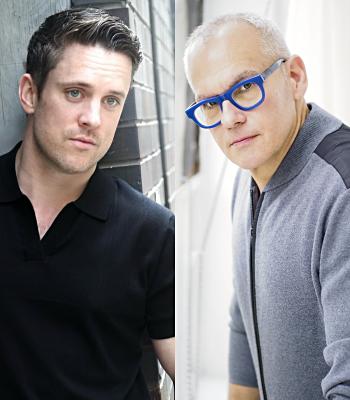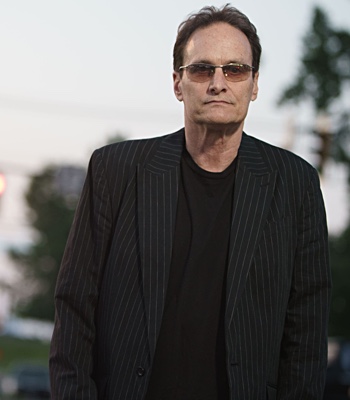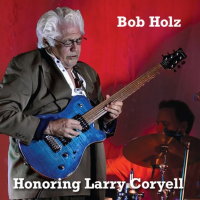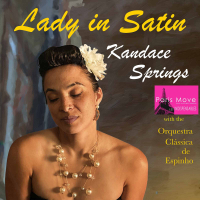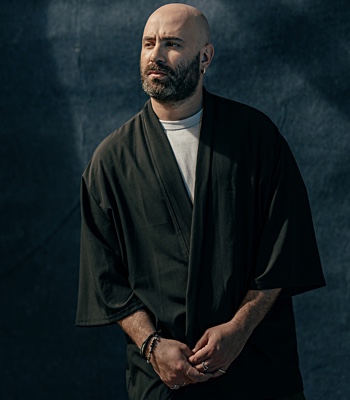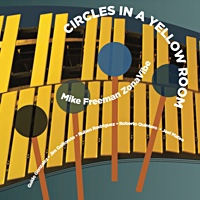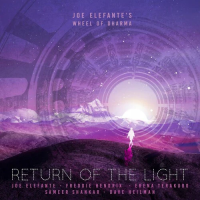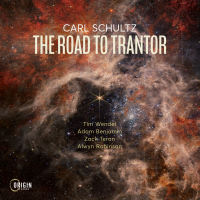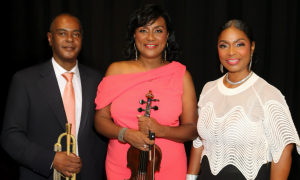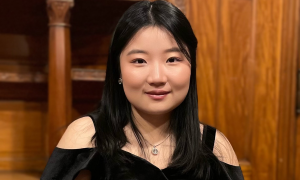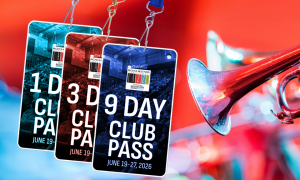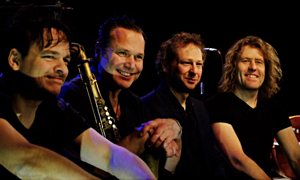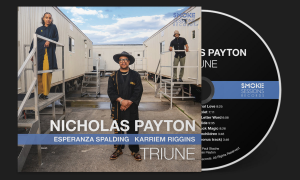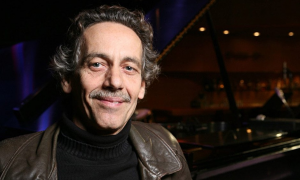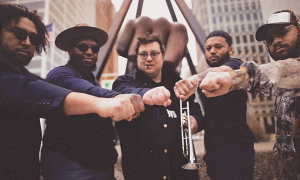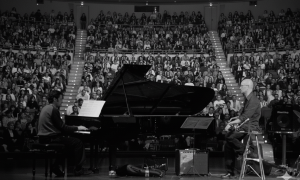By Pico
This bundle extracted from The Stacks is a real mish-mash of jazz styles: whack (of course), third stream, rock fusion, ethnic fusion and more. Established vets showing us how it was done in the old days and open minded newcomers infusing new ideas. Heck, there's even older guys trying out new ideas. That's what is so great about jazz, the performers come in all stripes, approach their music from all different angles and have formed different conceptions about their art, and it's all good. So let's this train rolling for the fifth leg of this trip through the Stacks...
Holly Hoffman and Bill Cunliffe Three's Company: Although she's made bop-oriented records for over twenty years, Holly Hoffmann is not as well known as she probably should be. A flautist of the first order, she's the logical heir to Frank Wess' legacy. Bill Cunliffe is accomplished in the jazz world himself, having won the Monk piano competition in 1989, recorded with some heavy hitters like Frank Sinatra and Natalie Cole, and has made a string of well-regarded records as a leader for nearly twenty years. But he also has a long history of recording with Hoffman, having served as a sideman and co-led three prior dates with her. Two of them, Just Duet Vols. 1 and 2, were almost entirely true duos, while Live At Birdland was a quartet setting with Victor Lewis and Ray Brown. Three's Company is more like Just Duet, except that half the tracks are trios, and therein lies the twist: the third player each time is a different player with a different instrument (Regina Carter, violin; Alvester Garnett, drums; Ken Peplowski, clarinet; Terell Stafford, trumpet). The music is the kind of stuff they love to do together: bop, but with classical influences. Some of it falls under “chamber" jazz, such as “Pavane," while the title cut (with Stafford) is noteworthy for the unison bebop lines. However, the foundation for this record is a rock-solid rapport between Hoffmann and Cunliffe: on “Dalto" for instance, Cunliffe's piano plays both the bass line and melodic counterpart to Hoffman's flute, make it sound fuller than the mere two instruments playing it. All told, Three's Company is yet another successful collaboration between two longtime musical partners.
Ken Thomson And Slow/Fast It Would Be Easier If: Like Jason Stein, Gutbucket co-founder Ken Thomson is a bass clarinetist—-he's an alto saxophonist, too—-and both like to play along the margins of jazz, but Thomson's conception of music freely spills over into other styles as well. His latest project, Ken Thomson And the Slow/Fast, is a quintet with him and Russ Johnson (trumpet) forming the brass front line, Nir Felder on Felder on guitar, Adam Armstrong on bass and Fred Kennedy on drums. They really means it with this whole “slow/fast" dichotomy: the five tracks here alternately either take is nice and easy or kicks it into thrash jazz mode. “Kleine Helmet" is folky and dreamy like a Bill Frisell song, while the immediately following “Goddamn You Ice Cream Truck" sounds like a punk rock band with a disciplined horn section. Either the songs reveal themselves gradually like a stripper over a ten minutes time frame, or punch you in the face like the stripper's jealous boyfriend, sometimes within the same song. There's not a terribly lot of soloing going on here and there's no need to be, as Thomson opts for charted unison lines that are often more stupefying than the improvised solos. Those charts get to the heart of what It Would Be Easier If is about: classically structured music welded to modern,whack jazz, rock and world fusion sonorities. Those things aren't necessarily evident right off, so if you don't like this record the first time out, keep listening. Eventually it'll sink in quite nicely.
Eugene Marlow's Heritage Ensemble Celebrations: So often in recent years we've heard jazz played in a traditional Jewish style, aka “Klezmer" jazz. Arranger/composer and keyboardist Eugene Marlow puts this idea in reverse: taking traditional Jewish songs and playing them in mainstream, Afro-Cuban, Brazilian and even contemporary jazz styles. The second Heritage Ensemble CD (the first one came out in 2006) is another of Dr. Marlow's & Co.'s imaginative experimentation with old Hebraic hymns and folksongs. Marlow was careful to keep the original melodies largely intact, but reharmonizes them to create something new out of something old. He also tinkered with the tempo; a traditional mid-tempo song might be recast as a ballad, and a slow-paced tune could be set to a lively Latin rhythm. His ensemble of five players including himself aren't all of Jewish heritage: the drummer and the percussionist are of Puerto Rican descent and the saxophonist is from Lebanon, for instance. Marlow intentionally assembled these players because he wanted fresh perspectives on these old Jewish tunes and getting them from those with non-Jewish backgrounds helped him to get that. This is why Celebrations doesn't even require one to like Hebraic music to enjoy this record, and it can even help those unfamiliar with that kind of music to embrace its ancient but often festive melodies.
The Ray Anderson-Marty Ehrlich Quartet Hear You Say—Live In WillisauHear You Say—Live In Willisau. Even on an ode to a fallen friend ("Portrait Of Leroy Jenkins") and the chromatic ballad ("My Wish") they pour on the intensity, but get downright giddy on harder tunes like “Hot Crab Pot," a song that boils over with as much intensity as the title suggests. “Alligatory Rhumba" is a delightful Cuban party song built from a Latin dance rhythm that the Brad Jones (bass)/Matt Wilson (drums) rhythm section—-no, there's no piano—-devises, and Anderson and Ehrlich are practically dancing all over it. The rapport, heck, more like the involved conversation between these two is the product of more than 30 years of playing together off and on, since they both found themselves in Anthony Braxton's band in 1978. For these seven originals written by either one or the other, the sounds of old school jazz horns like a trombone and clarinet suggest trad jazz but the barely contained way they go about expressing themselves hint at whack jazz. The resulting hybrid can only be called “fun jazz."
Jeff King Catalyst: “Catalyst" is not just the name of the album, it's also the name of the band sax/flautist King leads, and this is their debut album. This band which features King, Luis Deniz (saxophones), David Braid (piano and keyboards), Rich Brown (bass), Joel Haynes (drums), have Juno Award (Canadian Grammies) and National Jazz Award winners amongst their ranks. The refined chops that garnered them the accolades are evident on this record, a slick piece of jazz fusion. Slick, yes, but not smooth jazz: just too much in the way of and varying, unpredictable and intricate melodies to earn the smooth jazz tag. “Issues," for instance, is a jazz funk using an uneven time signature for the first half and breaks down to a searching, simmering and soulful groove for most of the second half. Songs like “In Transit" is shows why King went for a dual saxophone font line: both he and Deniz playing competing harmonies that underline the cleverly constructed cyclical melody. King's songs work so well that the two pop covers he chose to rework for this album ("Don't Give Up" and Strawberry Fields Forever") don't quite reach the same level of excitement. Brown is a central figure in this band; it seems his Jimmy Haslip bass lines get my attention on every song; in fact, Catalyst draws favorable comparisons to the Yellowjackets. Very competent fusion all the way through and distinguished in spots, Catalyst is the band putting their best first step forward.
Stephen Haynes Parrhesia: After all the whack jazz winners I've heard from Engine Studios, I've come to expect nothing but excellence whenever I pop in a CD from that label for the first time, and I've yet to be disappointed. Label head and producer Steven Walcott signs up creative, free thinking musicians new or old, overlooked or established, puts them in a studio and just lets them be themselves. Such is the case for Haynes and his Engine release Parrhesia; I haven't previously heard of Haynes, but given the guys he brought in the studio with him: Warren Smith (drums, percussion, marimba, voice), Joe Morris (electric guitar) and Walcott behind the boards, just how bad can this be? And guess what, it isn't. Haynes, who plays trumpet, flugelhorn and cornet, also plays a nasty, scowling, howling mute on “Reclamation," and Smith is throwing down his usual odd assortment of unconventional rhythmic patterns and timbre, as Morris makes his guitar sound like a bowed bass. The three discreetly improvise together with Smith on marimba and seek out strange new timbres (for “Quietude," and “St. Louis Sonority") and Haynes' horn gets fractured and fragile for “Flowers For Ida." Morris, tapping on his detuned guitar, combines with Smith to devise an unmistakably African groove on “Invocation" that Haynes, exhibiting the maturity of a trumpet player by the name of Miles, rides the groove and carefully picks his spots where to place his menacing notes. It's all eerily beautiful music. Parrhesia, “to speak everything," in other words, “to speak freely," perfectly describes what Haynes, Morris and Smith did here on this striking debut by Haynes. And they speak Free fluently.
Purchase: Stephen Haynes—Parrhesia
This bundle extracted from The Stacks is a real mish-mash of jazz styles: whack (of course), third stream, rock fusion, ethnic fusion and more. Established vets showing us how it was done in the old days and open minded newcomers infusing new ideas. Heck, there's even older guys trying out new ideas. That's what is so great about jazz, the performers come in all stripes, approach their music from all different angles and have formed different conceptions about their art, and it's all good. So let's this train rolling for the fifth leg of this trip through the Stacks...
Holly Hoffman and Bill Cunliffe Three's Company: Although she's made bop-oriented records for over twenty years, Holly Hoffmann is not as well known as she probably should be. A flautist of the first order, she's the logical heir to Frank Wess' legacy. Bill Cunliffe is accomplished in the jazz world himself, having won the Monk piano competition in 1989, recorded with some heavy hitters like Frank Sinatra and Natalie Cole, and has made a string of well-regarded records as a leader for nearly twenty years. But he also has a long history of recording with Hoffman, having served as a sideman and co-led three prior dates with her. Two of them, Just Duet Vols. 1 and 2, were almost entirely true duos, while Live At Birdland was a quartet setting with Victor Lewis and Ray Brown. Three's Company is more like Just Duet, except that half the tracks are trios, and therein lies the twist: the third player each time is a different player with a different instrument (Regina Carter, violin; Alvester Garnett, drums; Ken Peplowski, clarinet; Terell Stafford, trumpet). The music is the kind of stuff they love to do together: bop, but with classical influences. Some of it falls under “chamber" jazz, such as “Pavane," while the title cut (with Stafford) is noteworthy for the unison bebop lines. However, the foundation for this record is a rock-solid rapport between Hoffmann and Cunliffe: on “Dalto" for instance, Cunliffe's piano plays both the bass line and melodic counterpart to Hoffman's flute, make it sound fuller than the mere two instruments playing it. All told, Three's Company is yet another successful collaboration between two longtime musical partners.
Ken Thomson And Slow/Fast It Would Be Easier If: Like Jason Stein, Gutbucket co-founder Ken Thomson is a bass clarinetist—-he's an alto saxophonist, too—-and both like to play along the margins of jazz, but Thomson's conception of music freely spills over into other styles as well. His latest project, Ken Thomson And the Slow/Fast, is a quintet with him and Russ Johnson (trumpet) forming the brass front line, Nir Felder on Felder on guitar, Adam Armstrong on bass and Fred Kennedy on drums. They really means it with this whole “slow/fast" dichotomy: the five tracks here alternately either take is nice and easy or kicks it into thrash jazz mode. “Kleine Helmet" is folky and dreamy like a Bill Frisell song, while the immediately following “Goddamn You Ice Cream Truck" sounds like a punk rock band with a disciplined horn section. Either the songs reveal themselves gradually like a stripper over a ten minutes time frame, or punch you in the face like the stripper's jealous boyfriend, sometimes within the same song. There's not a terribly lot of soloing going on here and there's no need to be, as Thomson opts for charted unison lines that are often more stupefying than the improvised solos. Those charts get to the heart of what It Would Be Easier If is about: classically structured music welded to modern,whack jazz, rock and world fusion sonorities. Those things aren't necessarily evident right off, so if you don't like this record the first time out, keep listening. Eventually it'll sink in quite nicely.
Eugene Marlow's Heritage Ensemble Celebrations: So often in recent years we've heard jazz played in a traditional Jewish style, aka “Klezmer" jazz. Arranger/composer and keyboardist Eugene Marlow puts this idea in reverse: taking traditional Jewish songs and playing them in mainstream, Afro-Cuban, Brazilian and even contemporary jazz styles. The second Heritage Ensemble CD (the first one came out in 2006) is another of Dr. Marlow's & Co.'s imaginative experimentation with old Hebraic hymns and folksongs. Marlow was careful to keep the original melodies largely intact, but reharmonizes them to create something new out of something old. He also tinkered with the tempo; a traditional mid-tempo song might be recast as a ballad, and a slow-paced tune could be set to a lively Latin rhythm. His ensemble of five players including himself aren't all of Jewish heritage: the drummer and the percussionist are of Puerto Rican descent and the saxophonist is from Lebanon, for instance. Marlow intentionally assembled these players because he wanted fresh perspectives on these old Jewish tunes and getting them from those with non-Jewish backgrounds helped him to get that. This is why Celebrations doesn't even require one to like Hebraic music to enjoy this record, and it can even help those unfamiliar with that kind of music to embrace its ancient but often festive melodies.
The Ray Anderson-Marty Ehrlich Quartet Hear You Say—Live In WillisauHear You Say—Live In Willisau. Even on an ode to a fallen friend ("Portrait Of Leroy Jenkins") and the chromatic ballad ("My Wish") they pour on the intensity, but get downright giddy on harder tunes like “Hot Crab Pot," a song that boils over with as much intensity as the title suggests. “Alligatory Rhumba" is a delightful Cuban party song built from a Latin dance rhythm that the Brad Jones (bass)/Matt Wilson (drums) rhythm section—-no, there's no piano—-devises, and Anderson and Ehrlich are practically dancing all over it. The rapport, heck, more like the involved conversation between these two is the product of more than 30 years of playing together off and on, since they both found themselves in Anthony Braxton's band in 1978. For these seven originals written by either one or the other, the sounds of old school jazz horns like a trombone and clarinet suggest trad jazz but the barely contained way they go about expressing themselves hint at whack jazz. The resulting hybrid can only be called “fun jazz."
Jeff King Catalyst: “Catalyst" is not just the name of the album, it's also the name of the band sax/flautist King leads, and this is their debut album. This band which features King, Luis Deniz (saxophones), David Braid (piano and keyboards), Rich Brown (bass), Joel Haynes (drums), have Juno Award (Canadian Grammies) and National Jazz Award winners amongst their ranks. The refined chops that garnered them the accolades are evident on this record, a slick piece of jazz fusion. Slick, yes, but not smooth jazz: just too much in the way of and varying, unpredictable and intricate melodies to earn the smooth jazz tag. “Issues," for instance, is a jazz funk using an uneven time signature for the first half and breaks down to a searching, simmering and soulful groove for most of the second half. Songs like “In Transit" is shows why King went for a dual saxophone font line: both he and Deniz playing competing harmonies that underline the cleverly constructed cyclical melody. King's songs work so well that the two pop covers he chose to rework for this album ("Don't Give Up" and Strawberry Fields Forever") don't quite reach the same level of excitement. Brown is a central figure in this band; it seems his Jimmy Haslip bass lines get my attention on every song; in fact, Catalyst draws favorable comparisons to the Yellowjackets. Very competent fusion all the way through and distinguished in spots, Catalyst is the band putting their best first step forward.
Stephen Haynes Parrhesia: After all the whack jazz winners I've heard from Engine Studios, I've come to expect nothing but excellence whenever I pop in a CD from that label for the first time, and I've yet to be disappointed. Label head and producer Steven Walcott signs up creative, free thinking musicians new or old, overlooked or established, puts them in a studio and just lets them be themselves. Such is the case for Haynes and his Engine release Parrhesia; I haven't previously heard of Haynes, but given the guys he brought in the studio with him: Warren Smith (drums, percussion, marimba, voice), Joe Morris (electric guitar) and Walcott behind the boards, just how bad can this be? And guess what, it isn't. Haynes, who plays trumpet, flugelhorn and cornet, also plays a nasty, scowling, howling mute on “Reclamation," and Smith is throwing down his usual odd assortment of unconventional rhythmic patterns and timbre, as Morris makes his guitar sound like a bowed bass. The three discreetly improvise together with Smith on marimba and seek out strange new timbres (for “Quietude," and “St. Louis Sonority") and Haynes' horn gets fractured and fragile for “Flowers For Ida." Morris, tapping on his detuned guitar, combines with Smith to devise an unmistakably African groove on “Invocation" that Haynes, exhibiting the maturity of a trumpet player by the name of Miles, rides the groove and carefully picks his spots where to place his menacing notes. It's all eerily beautiful music. Parrhesia, “to speak everything," in other words, “to speak freely," perfectly describes what Haynes, Morris and Smith did here on this striking debut by Haynes. And they speak Free fluently.
Purchase: Stephen Haynes—Parrhesia

